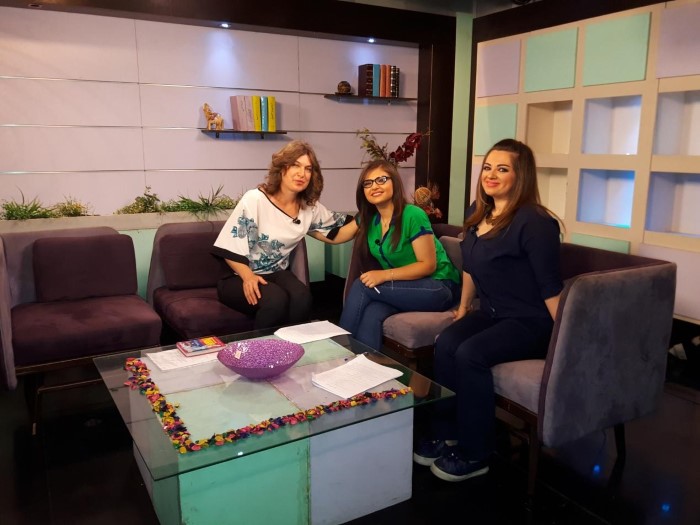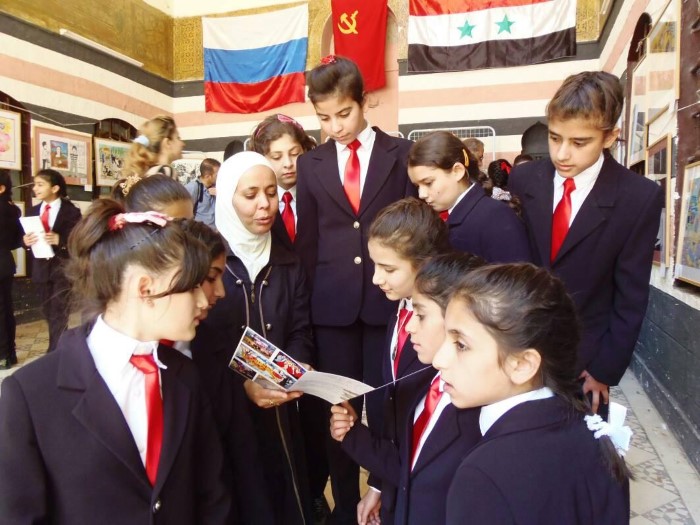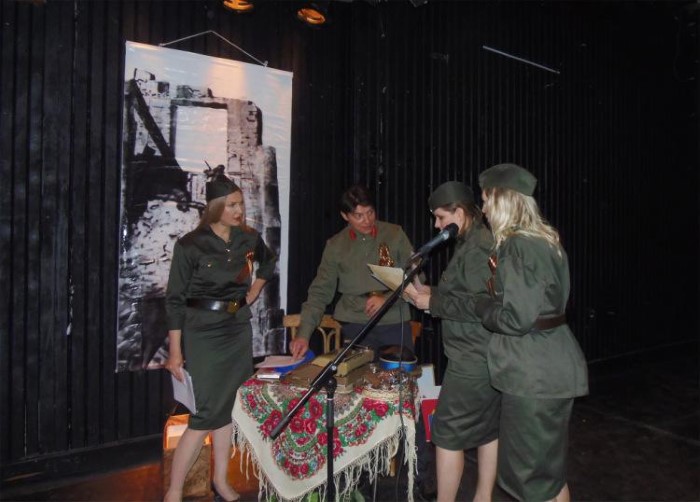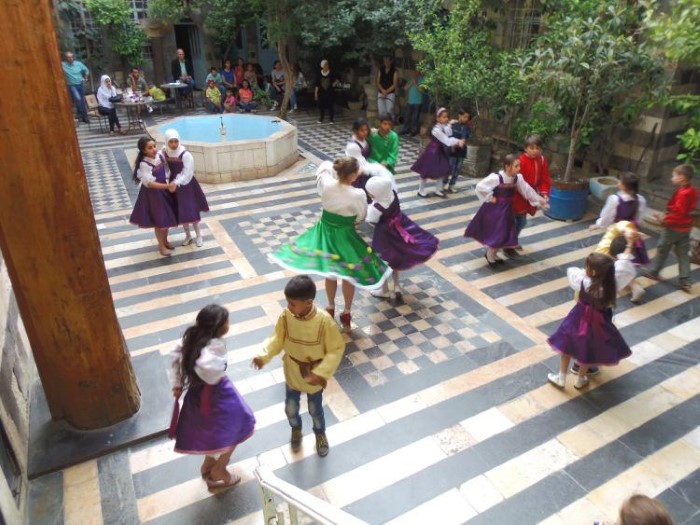
“There is more demand for the Russian language in Syria right now than ever before”
/ Главная / Russkiy Mir Foundation / Publications / “There is more demand for the Russian language in Syria right now than ever before”“There is more demand for the Russian language in Syria right now than ever before”
Svetlana Smetanina
Today, nearly 11 thousand Syrian schoolchildren study the Russian language. Instructors for these students are trained in the Russian Language Department of Damascus University, where our compatriot Svetlana Rodygin teaches. She also participated in the Russkiy Mir Foundation anniversary conference. In an interview, she tells us how things have worked out for Russian women who have found themselves in Syria during these difficult wartimes.

Svetlana Rodygina (left) in the studio of the Syrian Ministry of Education Teaching Channel
Svetlana Rodygina is a philologist and Russianist, an instructor in the Russian Language Department of Damascus University, a member of the Commission for Developing Russian Language Textbooks for Syrian Schools under the Ministry of Education, and the creator of programs “Russian Language Classes” and “Kaleidoscope” (about Russia) on the teaching channel of the Syrian Ministry of Education. She has lived in the Syrian Arab Republic since 1992.
– Tell us about the Russian Language Department at Damascus University. When was it founded? How did it develop?
– The Russian Language Department opened at Damascus University in September 2014. Now this department has 166 students. Next year will see its first graduates. Eight instructors work in the department, five of whom speak Russian as a first language. The university trains Russian language instructors for Syrian general education schools, into whose curriculum the Russian language was introduced beginning in the 2014/15 school year.
The department has established a partnership with the Moscow University for Industry and Finance “Synergy,” the representatives of which are well known in Damascus. Thanks to this university, students in the department have been provided with basic textbooks. It was also by the invitation of Synergy that our nine top students went to Moscow in April 2017 for a two-week internship, which allowed them to get acquainted with the rich culture, history and traditions of Russia—the country whose language they chose for their future professional activity. This linguistic immersion allowed them put the knowledge they had gained to use and helped them activate their speaking. The Syrian students interacted with Russian coevals and received unforgettable emotions.

Exhibition of Drawings by Syrian Students
– What is the situation now? Is the number of students who want to study Russian growing?
– In the 2014-15 school year, Russian was introduced into the curriculum of Syrian general education schools as a second foreign language—they could choose between Russian and French. Syrian students begin to study their second foreign language from the seventh grade. 2500 students at 59 schools chose to study Russian. The Ministry of Education didn’t set a goal of introducing Russian everywhere; this would have been impossible under the conditions of military activity, and also on account of lacking the necessary number of qualified teachers.
Textbooks were prepared and printed by the Syrian Ministry of Education on a very short schedule and under difficult conditions. Today they have undergone successful trials in the 7th, 8th, and 9th grades. The textbook takes into account the specific requirements of the students’ ages and the details of local life; it is distinguished by its simplicity and the inclusion of visual material, which provides a great help to the instructor in class. The material gradually becomes more complicated: in the 10th and 11th grades students can read stories by Leo Tolstoy and Kuprin, while becoming acquainted with the lives and accomplishments of famous Russian scientists, artists, and writers. Before the beginning of each school year, courses are organized for teachers, where they become acquainted with teaching methodology, ask pressing questions, and share their experiences.
On the teaching channel of the Ministry of Education, a show was produced called “Russian Language Lessons,” which presents an introductory phonetic course. This program helps deal with difficulties in pronunciation. The program makes use of excerpts from popular Soviet and Russian cartoons.
In the 2015-16 academic year, the number of students wanting to learn Russian exceeded 7500, and the number of schools rose to 105.
And that’s not the limit. In the current academic year, there are already 10,790 students in 12 Syrian cities studying Russian. The cities of Tartus and Lattakia have the highest numbers of students. Overall, there are 75 instructors employed in these schools, including Syrians (graduates from Soviet universities) and Russians who have gained the love and respect of the children.
Today, one can say confidently that Russian language instruction goes on successfully. This is confirmed by the results of the ninth-grade exams, which became public on 14 July of this year. 1,763 students in this grade took the Russian language exam. 1,479 students passed the exam successfully. 14 of them received a score of 100%.
There is more demand for the Russian language in Syria right now than ever before. There is a strong motivation for learning it. Students who choose Russian can continue studying at Damascus University and travel to Russia to study, already knowing the language. Graduates from the Russian language department are awaited with impatience—they are guaranteed jobs. Specialists who know Russian are needed in other spheres of activity. The Russian language opens access to quality education, to achievements in the arts and sciences, and to a rich cultural heritage. Studying it assists in one’s general development and broadening one’s horizons, as well as the career development of specialists in various fields of knowledge.

Victory Day in the Women’s Club at the Russian Cultural Center
– Are many Russian women still in this country? What do they do there?
– Our female compatriots who have ended up in Syria are very different in terms of their education, culture, and standard of living. But the great and powerful Russian language unites them all. During peacetime, the primary location for meetings and all undertakings by the Russian diaspora was the Russian cultural center, which has always made it a priority to preserve, study, and popularize the Russian language for both Syrians and children of Russian citizens. It’s impossible not to think of the Russian School, where children of mixed marriages studied. Bilingual children studied Russian as a first language. At first, the school only offered a four-year course, but after a high number of requests by children and their parents, the children continued their education. So, they made it to the ninth grade and read Eugene Onegin.
Concerts and plays (in which the main participants were traditionally children) helped promote successful Russian language learning. The children traveled to Lebanon and Jordan with the plays The Adventures of Buratino and The Night Before Christmas. Through the efforts of teachers—who were, by the way, also our Russian compatriots—no less than three concerts were arranged at the school each year. New Year’s stories were repeated twice, filling a theater of 300 spectators.
In connection to the situation in the country, in January 2013 the Russian Cultural Center was temporarily shut down. The majority of children who studied here left the country along with their mothers. Many families were separated. But our remaining compatriots didn’t give up and continued to work to the best of their ability. So, on the eve of 2015, this group of enthusiasts decided to award the children with a fairy tale. The New Year’s play was staged in the theater of a boarding school set up for the children of heroes who perished for their country. The actors in it were Russian-speaking children and young people from 4 to 22 years of age. The spectators were transported into a joyful and picturesque world where there was no war. The applause didn’t quiet down for a long time, and no one wanted to leave.
The next endeavor was an exhibition of drawings by students at the Tavasiev Art School for Children in the city of Vladikavkaz, the Art School for Children and No. 1 School in Beslan, and the school at the Andreev Monastery in Moscow. The children sent drawings and letters to their Syrian peers in Damascus and transmitted them as a gift to the school for the children of heroes who had perished for their country. Syrian schoolchildren sent their works to Russia. They were shown at the exhibit “Syria. The Children of Heroes Draw,” which took place at Vladikavkaz.

Master Class in the Home of Syrian Sculptor Mustafa Ali
Not having space or finances of their own, our compatriots made arrangements with acquaintances and found a solution to their situation. So, in the workshop of the Syrian sculptor Mustafa Ali, master classes were conducted for the children of refugees, who learned to make paper snowflakes and dance a Russian quadrille. Thee classes will remain a vivid memory for Syrian children whose childhood was taken away by the war.
On the initiative of our Russian compatriots, the teaching channel of the Ministry of Education filmed two New Year’s tales in Russian; the actors in them were children who speak Russian as a native language, just like Arabic. They went on the air on 31 December, as a New Year’s present for all the students studying Russian in Syria. The film The Nutcracker was presented in capital city’s Opera Theater, and this became a significant event. The guests included Syrian schoolchildren, who could see themselves on screen in a video documentary about disseminating the Russian language in Syria and a trip undertaken by eighth-graders who won the Russian language Olympiad to the “Young Eagle” camp on the invitation of the Moscow University for Industry and Finance “Synergy.” Before the film screening, the students at one of the Damascus school showed their dance compositions, which were also prepared by one of our compatriots. The Russian-language film went on for a full hour, but not a single view left their spot earlier. The actors and organizers of the screening heard many warm words directed at them.
Thus, in the years of pain and sorrow, our compatriots strove to give warmth and happiness, however difficult it may be for them to do.
The organization of Russian women created on the basis of the Russian Cultural Center also continues its work. This work includes initiatives dedicated to holidays and memorial dates (such as New Year’s Day and Victory Day), poetic performances, and distributing humanitarian aid. Women’s clubs are active in various cities of Syria. They join together as the Coordination Council of Compatriots.
New publications

 Mikhail Kalatozov, a director who transformed the world of cinematography in many ways, was born 120 years ago. He was a Soviet film official and a propagandist. Above all, he was capable of producing movies that struck viewers with their power and poetic language.
Mikhail Kalatozov, a director who transformed the world of cinematography in many ways, was born 120 years ago. He was a Soviet film official and a propagandist. Above all, he was capable of producing movies that struck viewers with their power and poetic language.  Ukrainian authorities have launched a persecution campaign against the canonical Ukrainian Orthodox Church (UOC), the biggest one in the country's modern history. Over the past year, state sanctions were imposed on clergy representatives, searches were conducted in churches, clergymen were arrested, criminal cases were initiated, the activity of the UOC was banned in various regions of the country, and monasteries and churches were seized.
Ukrainian authorities have launched a persecution campaign against the canonical Ukrainian Orthodox Church (UOC), the biggest one in the country's modern history. Over the past year, state sanctions were imposed on clergy representatives, searches were conducted in churches, clergymen were arrested, criminal cases were initiated, the activity of the UOC was banned in various regions of the country, and monasteries and churches were seized.  When Nektary Kotlyaroff, a fourth-generation Russian Australian and founder of the Russian Orthodox Choir in Sydney, first visited Russia, the first person he spoke to was a cab driver at the airport. Having heard that Nektariy's ancestors left Russia more than 100 years ago, the driver was astonished, "How come you haven't forgotten the Russian language?" Nektary Kotlyaroff repeated his answer in an interview with the Russkiy Mir. His affinity to the Orthodox Church (many of his ancestors and relatives were priests) and the traditions of a large Russian family brought from Russia helped him to preserve the Russian language.
When Nektary Kotlyaroff, a fourth-generation Russian Australian and founder of the Russian Orthodox Choir in Sydney, first visited Russia, the first person he spoke to was a cab driver at the airport. Having heard that Nektariy's ancestors left Russia more than 100 years ago, the driver was astonished, "How come you haven't forgotten the Russian language?" Nektary Kotlyaroff repeated his answer in an interview with the Russkiy Mir. His affinity to the Orthodox Church (many of his ancestors and relatives were priests) and the traditions of a large Russian family brought from Russia helped him to preserve the Russian language.

 The leaders of the Friends of the Great Russia cultural association (Amici Della Grande Russia) in Italy believe that the Western policy of abolishing Russian culture in Europe has finally failed. Furthermore, it was doomed to failure from the beginning.
The leaders of the Friends of the Great Russia cultural association (Amici Della Grande Russia) in Italy believe that the Western policy of abolishing Russian culture in Europe has finally failed. Furthermore, it was doomed to failure from the beginning.  Name of Vladimir Nemirovich-Danchenko is inscribed in the history of Russian theater along with Konstantin Stanislavski, the other founding father of the Moscow Art Theater. Nevertheless, Mr. Nemirovich-Danchenko was a renowned writer, playwright, and theater teacher even before their famous meeting in the Slavic Bazaar restaurant. Furthermore, it was Mr. Nemirovich-Danchenko who came up with the idea of establishing a new "people's" theater believing that the theater could become a "department of public education."
Name of Vladimir Nemirovich-Danchenko is inscribed in the history of Russian theater along with Konstantin Stanislavski, the other founding father of the Moscow Art Theater. Nevertheless, Mr. Nemirovich-Danchenko was a renowned writer, playwright, and theater teacher even before their famous meeting in the Slavic Bazaar restaurant. Furthermore, it was Mr. Nemirovich-Danchenko who came up with the idea of establishing a new "people's" theater believing that the theater could become a "department of public education."  "Russia is a thing of which the intellect cannot conceive..." by Fyodor Tyutchev are famous among Russians at least. December marks the 220th anniversary of the poet's birth. Yet, he never considered poetry to be his life's mission and was preoccupied with matters of a global scale. Mr.Tyutchev fought his war focusing on relations between Russia and the West, the origins of mutual misunderstanding, and the origins of Russophobia. When you read his works today, it feels as though he saw things coming in a crystal ball...
"Russia is a thing of which the intellect cannot conceive..." by Fyodor Tyutchev are famous among Russians at least. December marks the 220th anniversary of the poet's birth. Yet, he never considered poetry to be his life's mission and was preoccupied with matters of a global scale. Mr.Tyutchev fought his war focusing on relations between Russia and the West, the origins of mutual misunderstanding, and the origins of Russophobia. When you read his works today, it feels as though he saw things coming in a crystal ball...